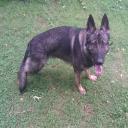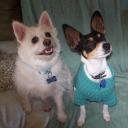Yahoo Answers is shutting down on May 4th, 2021 (Eastern Time) and beginning April 20th, 2021 (Eastern Time) the Yahoo Answers website will be in read-only mode. There will be no changes to other Yahoo properties or services, or your Yahoo account. You can find more information about the Yahoo Answers shutdown and how to download your data on this help page.
Trending News
More thoughts on dog training "methods"; in relation to our individual choices of the "type" and "purpose"?
of the dog we choose.
There is a wide cross section of who I consider very experienced and knowledgeable "dog people" here. The "purpose" of their dogs vary too. The amount of training necessary to achieve the dogs' purposes again vary. As well as what "methods" may work the best to achieve the "purpose".
Simple pet/companion: just around the house or hiking and camping and such. Competition dogs: obedience and rally. More sport/competition dogs: agility, dock dogs, frisbee etc. Hunting dogs. Herding dogs. Protection dogs. and all the others....
To best suit each purpose, there are specific "traits" that are virtues and traits that are faults. There are "instincts" to be considered, there is temperament... "bravery", sensitivity, willingness/biddability, and variations of "prey drive" (would that actually be instinct? hmm...)
This has been tumbling in my head for some time, originally inspired by particularly by you, Greekman, quite some time ago for all your "outspokeness" ;) then added to by the "temperate" Dutchman, and lastly by Curtis' (who seems more contemplative) recent question on training "methods"
I think we must understand that we are all very different people, with different personalities and interests. Although we feel our chosen "breed(s) and purpose(s)" is/are the best, it is so only to us. A reflection of who we are. What we want in a dog is very different from another. Greekman admits he is a warrior, and he is doing what he wants, with the dogs he wants. And his method of training obviously is what works for his dogs and their purpose. I assume, from what I recall from his posts, that he LIKES the challenge of a "driven, pushy" dog from the start. I am not a warrior, I dislike arguments, confontations and battles. I like to "work with" and share, not necessarily "win". And hence, I have a Border Collie. Her "instincts" are to be a working partner, to look for direction, to be "subtle". Her first time, and every time, she has been on sheep, she is keen, quiet, careful, will drop and call off immediately. When challenged by a ewe, her first exposure at about 4 months old, she did not hesitate to charge its head and force it to turn. If a sheep breaks, she will take off after it to try to turn it, but she does not attack. She does the job, with the amount of courage she was bred to have. Would she make a protection dog? Heck no! If someone shook a stick at her, she would take it as a correction and drop to the ground! However, I have seen many "herding breeds" over the years (many who are actually protection breeds) when presented with sheep, simply charge, chase and attack, ripping the wool out, going for the throats and having to be literally beaten off the stock. That is not a type of dog I would want. Doesn't suit me. And I totally accept you, Greekman, would not even feed my Border Collie. Not at all what would suit you. I am ok with that. But we should be understanding that either extreme, as well as the in between dogs and jobs, do have merit.
I believe when discussing "training methods", we all must understand that the "end" result, the "purpose" of the dog is going to partially determine the basic training method. Because the dog (breed, temperament) we have chosen to best suit our purpose is going to be very, very different from someone else whose dog is for a very different purpose.
I am not, with this, challenging anyone's training methods. I am not criticizing the use of pinch collars nor electric collars ( I have used the latter when I felt I had to resort to it). Nor "operant conditioning", nor........ I have admiration for effective trainers of field dogs, as I do protection dogs, as I do.... If I had a more "independent" breed, I know my training would need adjustment. If I had a "harder" breed, I know my training would have to be greatly adjusted!!
I do, secondly, want people to realize and accept that methods that are used by the "experts" here, for their "chosen purpose" dogs may not be the "best" for someone else.
NOW!!! The questions! If you are still here.
DID YOU CHOOSE YOUR "METHOD OF TRAINING" TO SUIT YOUR DOG'S PURPOSE? HAVE YOU ALTERED PART OF A METHOD?
AS TRAINING IS A CHALLENGE, HOW MUCH CHALLENGE DO YOU, PERSONALLY LIKE? ARE YOU REWARDED BY OVERCOMING CHALLENGES? AND WHAT SPECIFIC CHALLENGES DO YOU LIKE? DO YOU FEEL THESE TRAINING CHALLENGES ARE PARTIALLY RESPONSIBLE FOR THE METHOD OF TRAINING YOU HAVE CHOSEN? Please include your dog's breed, and "purpose".
Thanks for being patient. Sure wish I could have gotten one of you to edit this for post!
Yes, yes. It seems like this is a lecture...it is prelude to some questions. I just can't help but ramble. Fortunately I find communicating with dogs much easier.
Infinitely Superior: Ah ha! Here is the wisdom hiding behind your oft-times rude comments! Thanks! Excellent reply, succinct. unlike me ;( I particularly appreciated "you might be on your dawg like a chicken on a junebug for the same thing I would be praising." SO true!!! and the very important note on balance of training: may need "big cheering and equally firm correction"
Bcdawgma: ah! you sound just like me! oh oh, may not be a compliment....
memphis belle: excellent example of needing to go "harder"
ms manners: thank you for your great answer, specifying the "challenge" of training you most enjoy and want to put the work into is seeing "the foster dog as a puzzle to be solved".
ah Greekman! Aren't you glad you don't have to have a conversation with me ;) Thank you for answering. Despite seeming to pick on you, I usually give your replies a thumbs up!
Dutchman: yes! yes! Thank you for finding the "challenge preference". I find this consideration thought provoking.
rescue member: only praise and treats? No consequences? I think this may be the reason our human society is in dire straits.
Edit; I will not be awarding a best answer. You guys can duke it out!
17 Answers
- 1 decade agoFavorite Answer
I use motivational training to clearly teach a command, consistent practice with corrections to embed it & some form of compulsion training to ensure the dog responds first time, every time with distractions.
The Dobermann was created to work along side its handler as a protection dog, harnessing the characteristics of intelligence steadiness, obedience, handler focused, with a bold, alert & rock solid temperament.
The dominant breed characteristics & temperament shapes the way the Dobermann thinks & behaves. That said each dog is an individual, so the training method & tools are adapted to suit the temperament of the dog.
When a previous male Dobermann was bitten by a dog, thereafter he exhibited defensive aggression. To control his behavior he had a half check {I wish I had known about the prong collar}, given an immediate snap correction for aggressive behavior {though I muttered dire curses at dog owners who couldn't recall their dogs} & praised for focused calm behavior.
The training method was geared to the dogs temperament & response to environmental stimuli. It was very rewarding when he walked past dogs without hackles raised, growling & lunging.
- Anonymous1 decade ago
WOW...holy crap...this is the longest question I have ever seen.
Ok, I'll play...as far as general methods, Infinitely superior did a great job in answering the general question.
When it comes to dogs, I do enjoy the harder ones, the ones that present a challenge, the ones that can take a correction and come back without shutting down!
Of course my more esoteric methods will change with each dog, but, the result will always be the same...a great dog with realistic OB and protection work or detection or sport!
Teach with motivational methods and then use compulsion to proof. I have no problem using ANY tool I think will get the job done, whatever that may be!!
As far as being confrontational...it depends..I am the nicest guy when you meet me here, in person and under general circumstances.
I am not so social in the gym when working out because of my mind set there and the fact that I take that part of my life VERY seriously and I am a TOTAL prick at work, especially if I am deployed somewhere in the middle east.
The warrior mentality will always be there due to genetic and past military issues!!!
My dogs, well, I will tell you this...it takes 3 years of training to achive the LOWEST title in the NVBK and it is the hardest dog sport in the world, period!!
What did I forget here...not sure, but, if you need something else explained do it before the question gets deleted!!
Source(s): Realist - Anonymous5 years ago
There are a few real keys to dog training, whether you are trying to train your dog to come when called, sit, stop barking or any other behavior. Understanding their importance is critical to achieving rapid results that are long lasting and help develop the bond between you and your dog. Read more here https://tr.im/wgA3K
The first is simple; you must win your dogs mind. If you don’t achieve this first then you will be struggling the all the way. When I talk about winning your dogs mind what I really mean is that your dog looks to you for all the decisions. Before you do anything else watch one of the amazing video sites that show you the 5 Golden rules to establishing yourself as the pack leader. If you aren’t putting these in place then you are setting yourself up to fail. Just at the crucial point where you really want your dog to listen they will go and do their own thing. For sure your dog may play ball occasionally or even most of the time, you may even have a dog that is obedient 99% of the time, however if you want a dog who always listens to you and does as you ask then you need to win your dogs mind.
The second key to success is to motivate your dog. It is really important that you discover what it is that your dog enjoys both in terms of exercise and play but also in terms of a reward. If you can make the experience enjoyable then you will both achieve more and look forward to training.
Some dogs love to fetch, others love agility, and other dogs simply love obedience training, or swimming out into water and retrieve. At least to start with find out what your dogs love is and help them develop this, what I am saying is work with your dog. The other point to recognize is to make training enjoyable reward your dog.
- 1 decade ago
I chose my method of training because it works for ALL dogs. If anyone begs to differ Exhibit A: My 1 time fear biting teddy bear Boots (Jack Russell/Chihuahua mix) Exhibit B: My very shy, soft, inbred Dachshund rescue who came to me with NO FUR and bad teeth (still enjoys a raw diet with all 4 of her teeth that are left, lol). When you use the marker system of training it's non-confrontational which means you can use it on soft dogs and on handler hard dogs. Once the dog has learned different behaviors a simple "No" and putting the dog back into position BUILDS drive to do the exercise correctly so they can receive their reward. In a lot of other methods, a correction is issued instead and the dog goes DOWN in drive.
But in the end a dog who defiantly disobeys or disrespects you as a pack leader needs to be corrected. Every dog on the planet has done, is doing, or will do something that warrants a correction. I don't care what breed or how soft or if the poor thing has been "abuuuuused". If you don't give a timely correction when it's needed? You're training that negative behavior they just exhibited. "If you ain't correcting it, you're training it".
Edit - Btw - The #1 and #2 argument against my methods are: "Well I won't have treats 24/7 so I don't train with them/I want to train my dog to mind me not his stomach" well...that's why I have a corrections phase, to teach the dog he MUST obey whether I have treats or not, this argument is null. The #2 argument is "But I have an Aussie/Border Collie/Abused/Shy dog and corrections just aren't for my Binky!"...well if you fail to give a correction when needed you can either A: Learn to live with the problems you're creating or B: Will be required to give more and more serious corrections later down the road.
There are 3 phases to training: Learning: Where you show a dog what you want and motivate with treats and toys. The Corrections Phase: Where you show a dog it MUST obey the commands you taught it from phase 1 by correcting the dog when it fails to obey. And The Distractions Phase: Where you take the dog to new locations of varying distraction and use corrections to teach the dog that it must obey, no matter where you are, who or what is there, because you said so.
Marker training and keeping a dog in drive:
Source(s): I'm a professional GSD breeder/trainer. - How do you think about the answers? You can sign in to vote the answer.
- Anonymous1 decade ago
"Temperate"? lol...OK.
When I started training, I dealt with all breeds...90% were problem dogs. I had a huge number of Chows, Shar Peis, poorly bred Rottweilers, "Show" Shepherds...and loads of "Lap" dogs & mixes. Positive reinforcement (NOT to be confused with Positive ONLY) has always been a part of the training...as well as compulsion. A large number of the dogs I worked with had to be trained with a LOT of improvising....agility for confidence, starving, hanging, treats, passive dominance, redirection for aggression, and patience in general for some very "confused" dogs. When I was younger, I loved nothing more than getting my hands on something that wanted to kill me...it was exhilarating! The bigger & nastier, the better. After about 3500 of those, I chose to move primarily to Working GSD's. Generally, I'd say the closest thing to how I train would be Koehler. I can't help but reach into my past experience when dealing with any particular dog though. I'd have to say my method is to "Train the dog"...the quickest, most effective way possible....whatever it takes to ensure forward progress with every session. I never put the leash on with a set "Plan" in mind. I may have a goal....but how I get there depends on what the dog "brings to the table" that day, and every minute that we're working together.
So...no I haven't altered..and yet, I alter constantly. I chose Working GSD's because I love their drives and intelligence. The challenge now, is selecting the correct dog for each client. Again, my "Method" is to TRAIN THE DOG. If someone happens to know a method....that has nothing to do with whether or not they can train a dog. Look at all the "Canine College" graduates.....the majority can't train a dog to eat, sleep or sh*t....but they know a method.
- McSweenLv 41 decade ago
Long question....short answer. I
think people chose their training method based on their own personalities, beliefs and experiences not on the basis of the type of dog they have. The only serious training I have ever done is obedience - my current dogs are I guess what some would call trained - they reliably come, sit, lay, leave it, give paw, roll-over and so on but they are not TRAINED. There is in my opinion a difference.
I have always used praise and positive reinforcement along with corrections. This suits my personality and was also the way I learned to train animals. I did try using treats at one point but found that I then had a dog that listened only when I had a treat in hand -- not for me. I prefer a dog that takes its reward from my pleasure and works enthusiasticaly to gain that reward. This method has worked for me with all my dogs past and present which have ranged from Chows, to GSD's, to Labs, to Saint Bernards, American Eskimos, Leonbergers and plain old mutts.
- Anonymous5 years ago
Hi, I understand that you are looking for some advice or resources to help fully train your dog or fix behavior problems. If a professional dog trainer is not an option at this time, or if you want to trt training your dog on your own (a great way to bond), I'd suggest you https://bitly.im/aM75B
A friend recommened it to me a few years ago, and I was amazed how quickly it worked, which is why I recommend it to others. The dog training academy also has as an excellent home training course.
- Erika348Lv 71 decade ago
My method of training suits my dog's personality and sometimes geared towards their best traits. Yes, I altered my methods based on which dog I am training at the time.
My labs do dock diving - but not my Shih-Tzu. So yes, I find activities based on the breed and follow through with training for that activity. But all of mine have the basic obedience training.
I am also looking into Search and Rescue training for my younger lab because he is more active and is quite the "sniffer" - he uses his nose to find things much more than my older lab does. So that is a good example of training based on his trait.
As for challenges....I am currently in Competition Obedience training with a 12 month old lab. Have you ever seen an active, prey driven, curious 12 month old lab?
He's doing very well and just this week I feel that he and I have over come a huge obstacle in our training - he actually stayed in his sit / stay while smaller dogs and excited ones pranced all around him and I was at the other end of the room. That was made me so proud!
- GOODDLv 71 decade ago
I use several methods of training that set down a hard line of discipline. I have an Amstaff and kids and I need well behaved dogs - even though their purpose is "pet".
My other dog, a Golden mix, is very shy, timid and I had to bend a lot of the methods I use to not scare the pee out of her (literally).
Both dogs work around the house. The Golden is already trained to pull a wagon. The Amstaff is being trained. Together they will be working to help move hay and wood around our property. Both dogs will also be trained to track. We have several hundred acres of wooded land behind us and if my two kids go in there I need to be able to find them. Both dogs are also alarm systems for me and have been taught to alert when someone shows up at my house.
Regardless of purpose I think a good all around training method will work with the majority of dogs.
- ms mannersLv 71 decade ago
I agree that different people like different kinds of dogs. For myself, I prefer calm, intelligent, rather independent dogs.....very clingy dogs bug the heck out of me, and very high energy dogs irritate me. (Of course, in fostering I sometimes have to deal with both...but there is a party when they find their new owners :o).)
Obviously the same techniques will not work equally well with a "hard" dog and a "soft" dog, and there are a lot of techniques to choose from.
Some of my approach comes from my horse training background. I have had to make adjustments, since dogs and horses are different. However, many things are the same, since they are both social animals.
With both horses and dogs you need to inspire a balance of fear (respect) and trust. Many problem dogs (and horses) start on one end of the spectrum or the other, and need to be moved toward the middle.
I am always open to new ideas on how to do that. If an approach seems sensible to me, I will try it. If it works, I keep it. If not, I discard it.
I tend to see a new foster dog as a puzzle to be solved, and while it may sometimes be frustrating, when I am successful, that is my reward. The more difficult the challenge, the greater the reward when it is accomplished.
I tend to lose interest in both dogs and horses once they are trained....for me, getting there is most of the fun. :o)
But thats probably good...it makes it easier for me to let my foster dogs go.
Source(s): lots o dogs








